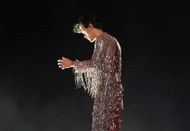Harry Styles' journey from boy-band stardom to solo success is not so much a standard music career trajectory as it is a cultural transformation. Hailing from the whirlwind of One Direction, he immediately showed that he wasn't simply another pop idol diversifying; he was an artist reshaping his own story.
Instead of adhering to the template of mainstream success, Harry Styles created a niche that defies the boundaries between retro rock sentimentality, contemporary pop experimentation, and fluid self-expression. His music transcends periods, his persona dissolves gender-boundaries, and his artistry becomes increasingly intimate and expansive.
Harry Styles doesn't merely produce hits; he creates experiences that sound both timeless and intensely personal, rendering his journey a soundtrack for a generation learning to love complexity, individuality, and emotional authenticity. Harry Styles' record catalog is the deeply personal expression of a generation grappling with identity, connection, and transformation.

From swooning ballads to frantic, guitar-based anthems, his music chronicles the broad range of human feelings without ever seeming to be contrived. Instead of adhering to one mood or sound, Harry Styles is not afraid to try new things and be open, writing songs that are intensely personal and universally relatable.
Harry Styles' recordings don't just sing about growth or love- they take us inside those wonderful, messy processes, so that his music is not only pop songs but, for millions of people, also personal soundtracks. This emotional integrity is what marks Harry Styles out in a hyper-saturated pop climate.
He doesn't employ grandiose productions or excessiveness to be heard; instead, his songcraft is defined by restraint, relying on subtle storytelling and honest delivery to win out.
Tunes like Matilda or Fine Line don't merely stop by emotion; they venture into it delicately, leaving space for introspection and not mere spectacle. Harry Styles' tracks contain a subtext of self-awareness, proving that his songs are not just a question of hook-laden choruses, but of content that lingers long after the song has finished.
Disclaimer: This article contains the writer's opinion. Reader discretion is advised.
Here are the top 10 Harry Styles songs every true fan knows by heart
Here are the top 10 Harry Styles songs every die-hard fan has memorized word-for-word, not just because they're hits, but because they've become emotional benchmarks in his career. These songs show the full gamut of his artistry, from the naked exposure of his ballads to the swagger and charm of his pop-rock anthems.
Each of them has left its stamp, either by having unforgettable lyrics, show-stopping vocals, or the warm way they've connected with listeners on a deeply personal level. These aren't just songs, these are moments that contain what it is to be a Harry Styles fan through every level of his constantly evolving sound.
1) Daylight
Daylight, from Harry's House, is notable not for being loud or flashy but for being surprisingly vulnerable in its simplicity. Rather than embracing larger-than-life Harry Styles-esque charisma, the song dims down, both musically and emotionally, to investigate the quiet pain of loving someone who might not feel a love-response.

The languid production serves to contrast with the tension of the lyrics beneath, in which he meditates on desire, distance, and emotional ambiguity. The recurring imagery serves to introduce a poetic frustration to the song, as if every day brings further illumination he does not wish to confront.
It's a delicate but resonant take on unrequited love, heightened further by Harry Styles' restraint; there isn't any climax or peak, just the hurt of uncertainty borne out by a disarmingly upbeat sound.
2) Sign of the Times
Harry Styles' solo success wasn't slowed to a crawl, it arrived in the form of the sweeping, six-minute title track Sign of the Times, a track that broke the mold of what was thought to be possible for a former boybander.
Rather than emulate the glossy pop templates that rocketed One Direction to international superstardom, Harry Styles re-emerged as a grown-up artist on a tough, emotionally bruising rock ballad that paid homage to '70s glam reference points. It begins with a skeletal, chilling piano motif, before swelling into a climactic release that's almost akin to a cinematic experience as opposed to a conventional single.
Lyrically, it does grapple with the themes of madness, helplessness, and endurance, but not towards resolution, more towards mood and urgency. What is so powerful about Sign of the Times is not so much its sonically expansive reach, but the fact that it was a statement of creative intent on Harry's part; he did not wish to repeat success, but push himself and others.
The soaring vocals of the song's dramatic peaks and troughs, and otherworldly melodies, betrayed a new willingness to take risks and get emotionally charged, which indicated that his solo career would not be defined by chart direction but by vision and accessibility.
3) Adore You
Adore You stands out in the discography of Harry Styles not just due to its lush sound, but due to the emotional restraint it negotiates, an ode to quiet admiration rather than grand declarations. In place of sweeping romantic gestures, the song gives us a quieter, gentler kind of love, the kind that does not require anything back.
With a melodic bassline and airy production, the song invites listeners to a world in which love is freely given, without condition or expectation. It resonates most strongly with those who have difficulty being affectionate openly because it captures the agony of wanting closeness with someone without smothering them.

The subtle confidence in Harry's singing adds to the intimacy of the song, rendering it personal rather than dramatic.
Its video, shot on the fictional island of Eroda, removes that emotional undertone to a fantasy drama of isolation, connection, and the inner fortitude it takes to give love. Adore You is more than just a love pop single; it's an honest moment wrapped in vibrant production, for anyone who has ever loved tenderly, steadily, and optimistically.
4) Matilda
Matilda, from Harry's House, is one of Harry Styles' most emotionally charged songs, not because it needs to be heard, but because it quietly provides compassion. Instead of issuing sweeping declarations, the song develops as an intimate chat, founded on compassion and an understated narrative.

It resonates with those who have grown up feeling invisible or unloved in their own homes, speaking to themes of emotional neglect and the quiet strength that comes after. But more than a description of one individual's suffering, Matilda becomes a broader exploration of how found family and chosen love can sometimes offer the support that traditional bonds cannot.
With subdued instrumentation and gentle, hurting vocals, Harry Styles offers a musical hug to listeners who've borne unseen wounds, and the song thus becomes a haven to anyone who's ever had to relearn what home is.
5) Watermelon Sugar
Few contemporary pop records have captured sun-kissed euphoria better than Harry Styles' Watermelon Sugar. A single on his Fine Line release, the song not only cruises on a wave of summertime nostalgia but creates its own.
Instead of depending on outright narrative, the song employs sensual vignettes to tap into the vertiginous buzz of new craving, coupling hyper-vivid images with a wispy, old-school-pop landscape.
It's flirting but not inadvertent, with a repetitive chorus in the style of a calming incantation, drawing listeners into something that is emotionally lightweight and softly charged. The genius of Watermelon Sugar lies in the way it pounds innocence and innuendo together so well, making it as friendly to throwaway listeners as it is refined to those who will read between the lines.
Apart from its literal beauty, the song was a turning point for Harry Styles' sound, making a bid for warmth, groove, and unyielding stylization without tipping into inauthenticity. The supporting music video, all sand-and-sea sensuality and kinetic euphoria, did little to dilute the song's atmosphere, elevating it from a mere summer jam. It was a mood of culture.
Whatever one supposes it is, one way or another, either a party of erotic sensuality or just the thrill of being alive for an instant, there's something of a special kind of happiness communicated in Watermelon Sugar: live, addictive, and unmistakably Harry.
6) As It Was
As the first single from Harry's House in 2022, As It Was was a stylistic departure for Harry Styles' music, and the emotional terrain he was finally ready to tackle. The song came in a breezy synth-pop wrapper that graciously masked its introspective intent.
Rather than offering us an obvious anthem, Harry Styles built an anti-anthem sound: glittery, club-based production and words that stumble through disconnection, emotional remoteness, and the perdurability of change.

The lyrics of As It Was in the song are less secret and more refrain-repeated. What sets the song apart from the rest isn't necessarily its pantheon single status or its hook-melody—it's its honesty rather than show.
As It Was understates change, doesn't mislead, but rather takes it in, makes that unhip, sad middle where memory stretches and tomorrow looks back. It's a lean but punchy investigation of alienation, self, and the bitter pang of evolution, cementing its place not just as one of the largest success stories of 2022 but as a milestone in Harry Styles' artistic growth.
7) Falling
Falling, from Harry Styles' Fine Line (2019), is a song that freely abandons the dense, hyperkinetic energy of much of his other work, plunging headlong into regret, self-guilt, and the agonized knowledge of irretrievable loss. The song is a raw, bare moment of Harry Styles, laying bare his inner conflict as he struggles with the aftermath of his actions.

From the piano melody in spectral guise, minimalist production is held back only to comment more forcefully on emotions in the lyrics, placing the strained but genuine voice of Harry Styles at center stage. It's not merely the collapse of a relationship, but the cringeworthy realization that one's own culpability has led it to this point of no return.
The weakness in his performance is relatable to the listener, recalling the self-doubt and pining for losing love and losing a loved one. The self-reflection in the lyrics, particularly in the chorus, is evocative of an instance of judgment, as Harry Styles questions the man he has turned into and the irreparable damage that has been done.
It is the emotional integrity of Falling that makes it stand out, with the sparse production letting the depth of his emotions pierce through. This isn't an album about break-ups; this is an experiment on self-improvement, errors, and the agony of witnessing something disintegrate due to your own actions.
In a sense, Falling was the fan-favorite simply because it was so universally relatable, and where it ended up on Fine Line only served to further solidify Harry Styles as a songwriter able to take such painful feelings and break them down into flawlessly structured songs.
8) Kiwi
Kiwi is the most defiant and cheerful of Harry Styles' debut album's songs, Harry Styles. A departure from his more mellow tries, this song has the rough-frock texture that captures immediate attention with its quick tempo and coarse guitar chords. It is a bouncy anthem which evokes free-spirited spontaneity, with Harry Styles spewing witty lines over a wild romance.

The chorus, rowdy and earworm, is catchy, particularly in live performances where the fans are part of the audience, also singing along to the loud Kiwi! chant. Although the meaning of the song is ostensibly cryptic, the perception of the song as being disobedient and the demeanor of the song as laid-back projects a new, untamed persona of Harry, thus becoming part of his high points.
The song is a prime example of his capacity to merge rock influences with his pop origins, and it's a fan-favorite, particularly for the high energy it lends to his performances.
9) Late Night Talking
Late Night Talking from Harry's House (2022) is a sunny, lovesick love ballad that builds the magic of late-night conversation and the excitement of closeness. Its retro-sounding beat, a little addicted to bass and glossed with synths, twirls nostalgia into something new for the modern day, coming together to become something ageless and freshly contemporary.

Harry's laid-back singing manner is one of warmth, as if he invites us into a cozy black room. Warmth and fun are constructed around words, put sugar in it, and the song is a hug. With its lighthearted, flirtatious tone and catchiness, Late Night Talking is both an emotional and sonic sanctuary, encapsulating Harry's skill at writing pop songs so seamlessly that they linger in minds far longer than the track itself.
10) From the Dining Table
From the Dining Table brings Harry Styles' first album to a close with a soft, sorrowful meditation that is both intimate and quietly shattering. Instead of theatrically amplifying heartbreak, the song dwells in the silence after connection dissolves, a lone morning in a cold hotel room, tormented by the lack of someone important.

Harry Styles softly unravels emotional distance, wondering if silence is worth it when words might provide closure or solace. It's a bare-bones scene that captures the pain of unspoken words and the burden of what remains unspoken.
Harry Styles' songs have never been about melody or chart performance alone, they're emotional vignettes, held together with candor, introspection, and an acute awareness of self. Throughout his shifting sound, from delicate acoustic confessions to aggressive, genre-defying anthems, he keeps leaning into vulnerability over spectacle.
His music doesn't just ask listeners to hear, but to feel, providing solace through heartbreak, growth, joy, and doubt. In the process, Harry Styles constructed more than an albumography; he's built a platform in which authenticity prevails, and each song seems like a dialogue between artist and listener.
Keep reading SoapCentral for more informative content!
Also Read: 12 Linkin Park songs every fan remembers
